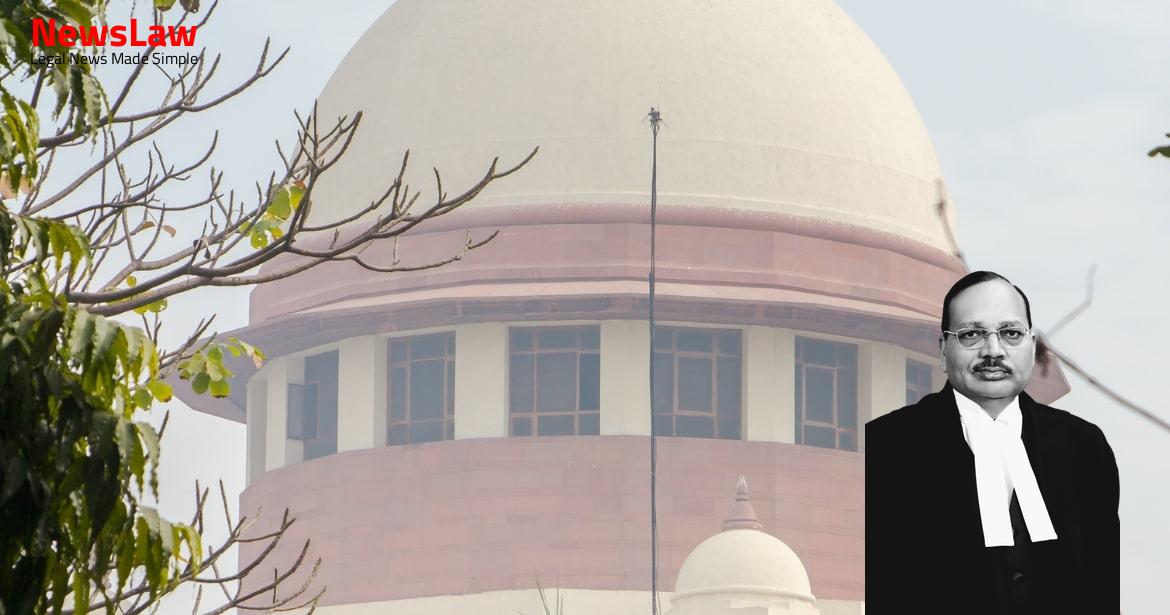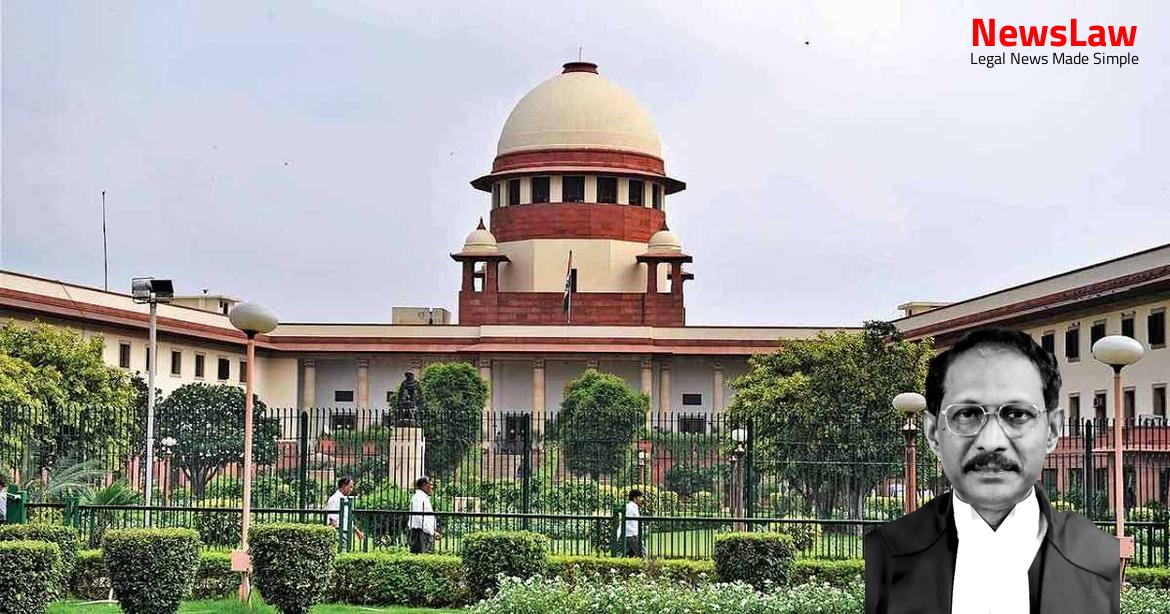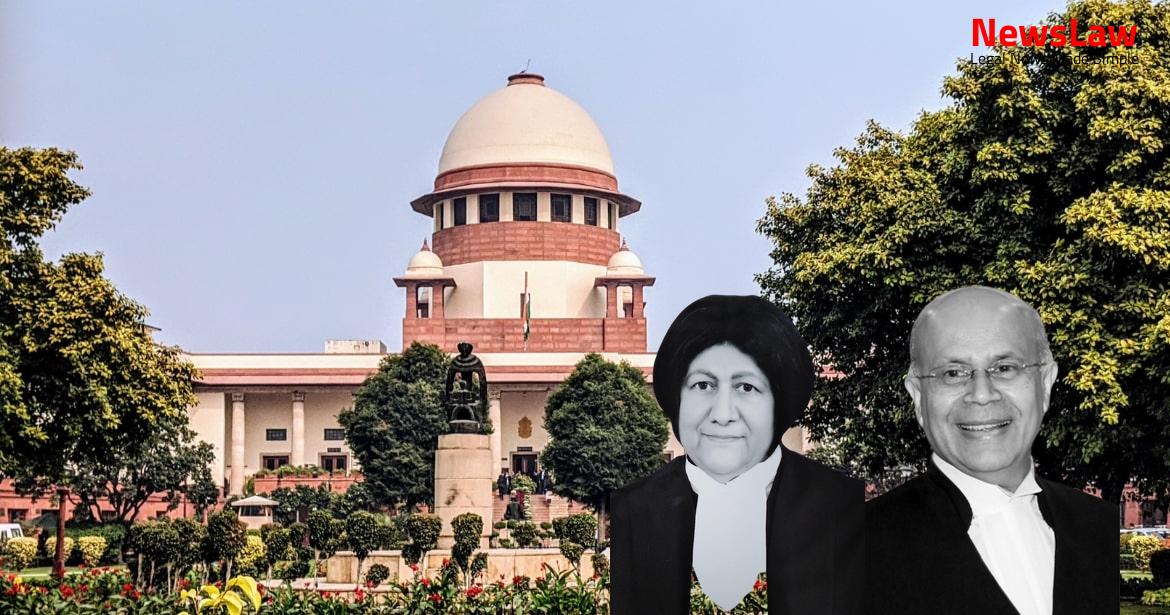In a significant legal battle, the Supreme Court of India recently delivered a judgment in the case of Tamil Nadu Medical Services Corporation Limited v. Tamil Nadu Medical Services Corporation Employees Welfare Union. The case revolves around the permanent status claim of employees in the Corporation. The appeal filed by Tamil Nadu Medical Services Corporation Limited has been dismissed, while the appeal by Tamil Nadu Medical Services Corporation Employees Welfare Union has been allowed, bringing forth important implications for employee rights and labour laws.
Facts
- 22 out of 53 workmen filed W.P. No.15241 of 2009 seeking a writ of mandamus.
- Inspector of Labour passed an order on March 31, 2001, framing issues regarding permanent status of workmen in the respondent Establishment.
- Cross-appeals were filed by Tamil Nadu Medical Services Corporation Limited and Tamil Nadu Medical Services Corporation Employees Welfare Union against the judgment and order dated August 9, 2019.
- Employees sought regularization under Tamil Nadu Industrial Establishments Act, 1981, with unsuccessful representations leading to writ petitions before the High Court.
- High Court ordered the application of Tamil Nadu Act 46 of 1981 to the Corporation and allowed the writ petitions accordingly.
- Subsequent appeals were filed against the orders of the High Court and the Inspector of Labour, leading to confirmations of the orders for employment of the concerned workmen in the Corporation.
- The impugned judgment in Writ Petition No.17133/2001 was against the Inspector of Labour’s order of March 31, 2001, accepting the permanent status claim of 53 workmen but rejecting 42 others.
- Inspector of Labour verified the service period of G. Sumathi and 52 other workmen, concluding their eligibility for permanent status in the Corporation.
- Leave to appeal by special leave was granted, and the operation of the impugned judgment was stayed by the Court on March 29, 2010.
- The Single Judge extensively examined the constitution of the management of the Corporation and its activities.
- The Single Judge concluded that the Act would apply as the Corporation was an industrial establishment.
- The Division Bench concurred with the Single Judge’s decision.
- No appeals were filed after the writ appeals against the Single Judge’s order were dismissed.
- The order of the Inspector of Labor had become final.
- On March 10, 2016, the Court allowed the appeal and remanded the matter to the High Court.
- The High Court was directed to consider whether the Act applied to the members of the respondent-Union.
- The High Court judgment agreed with the Single Judge’s decision.
Also Read: Landlord vs. Tenant: Interpretation of Rent Control Legislation in India
Issue
- Whether the Corporation can be termed as an industrial establishment as per the provisions reproduced supra
- Determining if the members of the Union would qualify as workmen and be eligible for permanent status under Section 3 of the Act
- Questioning the authority of the authorized office under the Act, being the Labour Inspector, to try this case
- Evaluating if the respondent’s Management is covered by the Jurisdiction of the Act and the nature of relief that could be awarded to the petitioners
Analysis
- The High Court did not consider the application of the Act to TNMSC Management properly.
- The Inspector of Labour had previously determined that TNMSC Management falls under the Tamil Nadu Act 46 of 1981 as an industrial establishment.
- TNMSC Management’s activities included construction and were for profit-making purposes.
- Simply because some employees found other employment does not justify dismissing others’ claims for permanent status.
- The Act applies to TNMSC Management as it meets the criteria of being an industrial establishment and having employees working uninterruptedly.
- The commercial element was present in TNMSC Management’s activities as confirmed by the Inspector of Labour’s order.
- The powers of Industrial and Labour Courts were not considered in Uma Devi case.
- Reference is made to the case of Maharashtra State Road Transport Corporation v. Casteribe Rajya Parivahan Karmachari Sanghathana, specifically paragraphs 32 to 36.
- In the case of U.P. Power Corporation Limited & Anr. v. Bijli Mazdoor Sangh & Ors., it was established that industrial adjudicators can vary terms of employment as long as it does not violate Article 14.
- If the case pertains to regularization, the same rule as in Bijli Mazdoor Sangh case applies.
- Citing ONGC Limited v. Petroleum Coal Labour Union & Ors. and Ajay Pal Singh v. Haryana Warehousing Corporation, it is argued that those who have reached the age of superannuation are entitled to compensation in lieu of regularization, as recognized in Ranbir Singh v. S.K. Roy, Chairman, Life Insurance Corporation of India & Anr.
- The Act does not apply to workmen employed in the construction of buildings, bridges, roads, canals, dams, or other construction work.
- For a workman to be conferred permanent status, they must be in continuous service for a period of four hundred and eighty days in a period of twenty-four calendar months in an industrial establishment.
- The definition of establishment under the Act includes shops, commercial establishments, restaurants, eating-houses, residential hotels, theatres, or places of public amusement or entertainment.
- Commercial establishments are defined as establishments that are not shops but engage in the business of advertising, commission, forwarding or commercial agency, or are clerical departments of a factory or industrial undertaking, insurance companies, joint stock companies, banks, broker’s offices, or exchanges.
- An industrial establishment is defined as per the Tamil Nadu Shops and Establishments Act, 1947 and includes any establishment declared by the Government to be an industrial establishment for the purpose of the Act.
- Workman is defined as any person employed in an industrial establishment to do skilled or unskilled, manual supervisory, technical, or clerical work.
- Establishments exclusively engaged in construction work are exempt from the Act.
- The objectives of the Corporation include designing and constructing hospitals and other buildings for various entities.
- The High Court acknowledged that the Act would apply to the case.
- Based on this conclusion, there was no reason to overturn the Inspector of Labour’s finding.
- The Inspector of Labour had ordered that the members of the respondent-Union be given permanent employment.
- It was deemed unnecessary and unjustified to have the order re-established under the Industrial Disputes Act.
- Requiring those already benefiting from the order to prove their claim again would be unfair.
Also Read: Paul v. X: Anticipatory Bail Appeal Success
Decision
- The order of the Inspector of Labour was passed under the Act.
- The scope of remand was limited.
- The appeal filed by the Corporation (Appeal arising out of SLP(C)No.30005 of 2019) is dismissed.
- The appeal filed by the respondent-Union through its President, G. Sumathi (Appeal arising out of SLP(C)No.2649 of 2020) is allowed with all consequences in favor of the respondent-employees, under the law, to follow.
Case Title: TAMIL NADU MEDICAL SERVICES CORPORATION LIMITED Vs. TAMIL NADU MEDICAL SERVICES CORPORATION EMPLOYEES WELFARE UNION (2024 INSC 446)
Case Number: C.A. No.-006511-006511 – 2024



